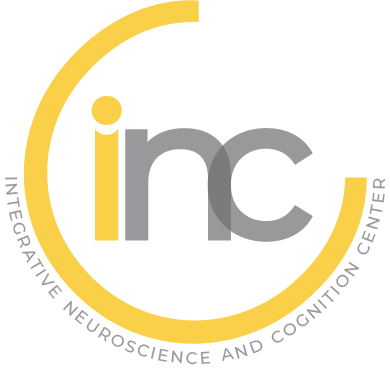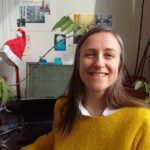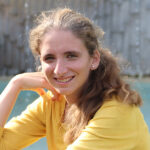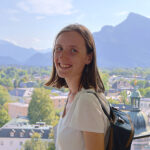LANGUAGE And COGNITION
The Language and Cognition team investigates the mechanisms and constraints at play in language acquisition and cognitive development. Our research is mainly conducted at the INCC BabyLab, a platform specifically designed to study young children. The babylab is equipped with different setups to run experiments using both behavioral (e.g., eye-tracking) and neuroimaging (EEG/ERP, NIRS) techniques. In addition to the research conducted in this laboratory environment, we also see participants in hospitals (especially in maternity wards), schools, as well as in public places, such as in science museums.
Read more
The team is a founding partner of LABEX EFL (Empirical Foundations of Linguistics), and of the babylab.
Research topics
Our research covers three main topics: Language acquisition, Mathematical cognition, and Social cognition.
Research questions on language acquisition focus on different levels of speech and language processing (e.g., acoustic, phonology, prosody, lexicon) in typically and atypically (e.g., hard of hearing infants using hearing devices, infants born prematurely) developing infants and children. We explore the perceptual and learning mechanisms supporting language acquisition at birth, the early auditory processing capacities, the developmental links between acquisition of phonology and lexicon, the development of the lexical-semantic organization, and the origins of pragmatic language abilities. We also investigate the impact of simultaneous bilingualism on early language acquisition.
Our research on mathematical cognition covers two domains: number, and geometry. In these two domains, we are interested in the perceptual foundations of mathematics: infants’ and children’s ability to perceive quantities and shapes, and to reason about these quantities and shapes. We are also interested in the propensity to use an oriented mental space to represent non-spatial information, such as ordered sequences – as it applies to the domain of number, but also to other domains.
Finally, related to social cognition, we explore the foundations and early development of social learning through observation and communication. We examine how infants and children learn from and about their social partners to uncover the mechanisms that enable and shape human social learning and cultural diversity. This includes investigating processes like action and social relation representations, metacognition, theory of mind, communication skills, trust, and naïve epistemology.
Photos © Hubert RAGUET / INCC / CNRS Images
TEAM MEMBERS
Team leaders
Permanent researchers
Visiting scientists
Support staff
Members
Post docs and PhD students
Members
︾ PUBLICATIONS ︾
Journal articles
2025
- ref_biblio
- Marie Aguirre, Mélanie Brun, Anne Reboul, Olivier Mascaro. The early ontogeny of expectations about communicative informativeness: from infants’ exemplar frequency tracking to preschoolers’ pragmatic inference. Language, Cognition and Neuroscience, 2025, pp.1-18. ⟨10.1080/23273798.2025.2563859⟩. ⟨hal-05343073⟩
- Accès au texte intégral et bibtex
-


- ref_biblio
- Dawei Bai, Alon Hafri, Véronique Izard, Chaz Firestone, Brent Strickland. “Core Perception”: Re-imagining Precocious Reasoning as Sophisticated Perceiving. Behavioral and Brain Sciences, 2025, pp.1 - 75. ⟨10.1017/s0140525x25102756⟩. ⟨hal-05364281⟩
- Accès au texte intégral et bibtex
-


- ref_biblio
- Isabelle Barrière, Blandine Joseph, Katsiaryna Aharodnik, Sarah Kresh, Guetjens Prince Fleurio, et al.. A multidimensional perspective on the acquisition of subject-verb dependencies by Haitian-Creole speaking children. Journal of Pidgin and Creole Languages, 2025, ⟨10.1075/jpcl.22001.bar⟩. ⟨hal-04197080⟩
- Accès au texte intégral et bibtex
-


- ref_biblio
- Clémence Basire, Irene Lorenzini, Laurianne Cabrera. Neural and psychoacoustic insights into amplitude modulation processing and its link with speech perception in noise. Journal of Neurophysiology, 2025, 133 (6), pp.1828-1835. ⟨10.1152/jn.00007.2025⟩. ⟨hal-05444819⟩
- Accès au texte intégral et bibtex
-


- ref_biblio
- Cyann Bernard, Adeline Depierreux, Viviane Huet, Olivier Mascaro. Infants Assume Questions Serve an Information‐Seeking Function, Link Them to Interrogative Sentences and Differentiate Them From Assertions. Child Development, In press, ⟨10.1111/cdev.14267⟩. ⟨hal-05093488⟩
- Accès au texte intégral et bibtex
-


- ref_biblio
- Julie Bodard, Thierry Nazzi, Géraldine Jean-Charles, Marco Pedrotti, Katrin Skoruppa. Difficulties in Nonadjacent Dependency Learning in French-Learning Toddlers. Journal of Speech, Language, and Hearing Research, 2025, 68 (8), pp.4061-4070. ⟨10.1044/2025_JSLHR-23-00608⟩. ⟨hal-05266634⟩
- Accès au texte intégral et bibtex
-


- ref_biblio
- Mireia Marimon, Elena Berdasco-Muñoz, Barbara Höhle, Thierry Nazzi. Use of Statistical and Acoustic Cues for Speech Segmentation in French-Learning 7-Month-Old Infants and French-Speaking Adults. Open Mind, 2025, 9, pp.189-209. ⟨10.1162/opmi_a_00184⟩. ⟨hal-05266619⟩
- Accès au texte intégral et bibtex
-


- ref_biblio
- Chloé Metz, Nicola Savill. Lexical-semantic support of verbal short-term memory under phonological demand: evidence for persistent imageability effects in immediate serial recall under rapid presentation and in dyslexic adults. Memory, 2025, pp.1-14. ⟨10.1080/09658211.2025.2536691⟩. ⟨hal-05175091⟩
- Accès au bibtex
-

- ref_biblio
- Thierry Nazzi. Rhythm is alive, though it is not (and never was) the whole story.. Journal of Experimental Psychology. Human Perception and Performance, 2025, 51 (7), pp.827-833. ⟨10.1037/xhp0001258⟩. ⟨hal-05266610⟩
- Accès au texte intégral et bibtex
-


- ref_biblio
- Paul Okyere Omane, Adebola A Isaiah, Reginald Akuoko Duah, Thierry Nazzi. Sustaining Language Acquisition Research in Africa: A Commentary on Scaff et al. (2025). Developmental Science, 2025, 28 (5), pp.e70063. ⟨10.1111/desc.70063⟩. ⟨hal-05266623⟩
- Accès au texte intégral et bibtex
-


- ref_biblio
- Leonardo Piot, Thierry Nazzi, Natalie Boll-Avetisyan, Sandrien van Ommen, Silvana Schmandt. Phonological biases in lexical access in French and German: Data from a familiar word-recognition conflict task. Infant Behavior and Development, 2025, 79, pp.102070. ⟨10.1016/j.infbeh.2025.102070⟩. ⟨hal-05266683⟩
- Accès au texte intégral et bibtex
-


- ref_biblio
- Emmanuel Ponsot, Victor Bauer, Nathan Goedseels, Clémence Basire, Laurianne Cabrera. Temporal modulation transfer functions derived from envelope following responses: what can they tell us about auditory midbrain tuning properties?. Journal of Neurophysiology, 2025, 135 (1), pp.42-50. ⟨10.1152/jn.00363.2025⟩. ⟨hal-05440930⟩
- Accès au texte intégral et bibtex
-


- ref_biblio
- Delphine Yeh, Célia Jantac, Sylvain Penaud, Maxine dos Santos, Gilles Martinez, et al.. Disrupted self-perspective impact on episodic memory in individuals with self-disorders: A virtual investigation in the Latin Quarter of Paris. Journal of Environmental Psychology, 2025, 106, pp.102712. ⟨10.1016/j.jenvp.2025.102712⟩. ⟨hal-05243695⟩
- Accès au texte intégral et bibtex
-


2024
- ref_biblio
- Charlotte Barot, Louise Chevalier, Lucie Martin, Véronique Izard. “Now I Get It!”: Eureka Experiences During the Acquisition of Mathematical Concepts. Open Mind, 2024, 8, pp.17-41. ⟨10.1162/opmi_a_00116⟩. ⟨hal-04790304⟩
- Accès au texte intégral et bibtex
-


- ref_biblio
- Irene de la Cruz‐pavía, Monica Hegde, Laurianne Cabrera, Thierry Nazzi. Infants’ abilities to segment word forms from spectrally degraded speech in the first year of life. Developmental Science, 2024, 27 (5), pp.e13533. ⟨10.1111/desc.13533⟩. ⟨hal-04751370⟩
- Accès au texte intégral et bibtex
-


- ref_biblio
- Monica Hegde, Thierry Nazzi, Laurianne Cabrera. An auditory perspective on phonological development in infancy. Frontiers in Psychology, 2024, 14, pp.1321311. ⟨10.3389/fpsyg.2023.1321311⟩. ⟨hal-04550458⟩
- Accès au texte intégral et bibtex
-


- ref_biblio
- Constantijn Kaland, Anjali Bhatara, Natalie Boll-Avetisyan, Thierry Nazzi. Iambic-trochaic grouping in native listeners of Papuan Malay, Akan and German. Journal of the Acoustical Society of America, 2024, 158 (1), pp.776-789. ⟨10.1121/10.0037212⟩. ⟨hal-05266725⟩
- Accès au texte intégral et bibtex
-


- ref_biblio
- Clarissa Montgomery, Bahia Guellaï, Pia Rämä. Is That You I Hear? Speaker Familiarity Modulates Neural Signatures of Lexical-semantic Activation in 18-month-old Infants. Journal of Cognitive Neuroscience, 2024, 36 (9), pp.1963-1976. ⟨10.1162/jocn_a_02218⟩. ⟨hal-04767165⟩
- Accès au bibtex
-

- ref_biblio
- Leonardo Piot, Thierry Nazzi, Natalie Boll-Avetisyan. Infants’ sensitivity to phonotactic regularities related to perceptually low-salient fricatives: a cross-linguistic study. Frontiers in Psychology, 2024, 15, pp.1367240. ⟨10.3389/fpsyg.2024.1367240⟩. ⟨hal-04550368⟩
- Accès au texte intégral et bibtex
-


- ref_biblio
- Leonardo Piot, Hui Chen, Anthony Picaud, Maxine dos Santos, Lionel Granjon, et al.. Tonal interference in word learning? A comparison of Cantonese and French. Journal of Experimental Child Psychology, 2024, 242, pp.105883. ⟨10.1016/j.jecp.2024.105883⟩. ⟨hal-04550312⟩
- Accès au texte intégral et bibtex
-


- ref_biblio
- Pia Rämä, Cydney Chiball, Yumisay Rukoz. Lexical-semantic activation in French-Spanish or French-English bilingual toddlers: An event-related potential (ERP) investigation. Journal of Neurolinguistics, 2024, 72, pp.101214. ⟨10.1016/j.jneuroling.2024.101214⟩. ⟨hal-04767172⟩
- Accès au bibtex
-

- ref_biblio
- Lucas Raynal, Evelyne Clément, Louise Goyet, Pia Rämä, Emmanuel Sander. Neural correlates of unconventional verb extensions reveal preschoolers’ analogical abilities. Journal of Experimental Child Psychology, 2024, 246, pp.105984. ⟨10.1016/j.jecp.2024.105984⟩. ⟨hal-04625739⟩
- Accès au texte intégral et bibtex
-


2023
- ref_biblio
- Tamara Bastianello, Irene Lorenzini, Thierry Nazzi, Marinella Majorano. The Language ENvironment Analysis system (LENA): A validation study with Italian-learning children. Journal of Child Language, In press, ⟨10.1017/S0305000923000326⟩. ⟨hal-04197069⟩
- Accès au texte intégral et bibtex
-


- ref_biblio
- Mercedes Bengochea, Jacobo D Sitt, Véronique Izard, Thomas Preat, Laurent Cohen, et al.. Numerical discrimination in Drosophila melanogaster. Cell Reports, 2023, 42 (7), pp.112772. ⟨10.1016/j.celrep.2023.112772⟩. ⟨hal-04257815⟩
- Accès au texte intégral et bibtex
-


- ref_biblio
- Elena Berdasco-Muñoz, Valérie Biran, Thierry Nazzi. Probing the Impact of Prematurity on Segmentation Abilities in the Context of Bilingualism. Brain Sciences, 2023, 13 (4), pp.568. ⟨10.3390/brainsci13040568⟩. ⟨hal-04197058⟩
- Accès au texte intégral et bibtex
-


- ref_biblio
- Irene de la Cruz-Pavía, Coraline Eloy, Paula Perrineau-Hecklé, Thierry Nazzi, Laurianne Cabrera. Consonant bias in adult lexical processing under acoustically degraded listening conditions. JASA Express Letters, 2023, 3 (5), pp.055206. ⟨10.1121/10.0019576⟩. ⟨hal-04197011⟩
- Accès au texte intégral et bibtex
-


- ref_biblio
- Charlotte Hym, Marie-Victorine Dumuids, David I Anderson, Vincent Forma, Joëlle Provasi, et al.. Newborns modulate their crawling in response to their native language but not another language. Developmental Science, 2023, 26 (1), pp.e13248. ⟨10.1111/desc.13248⟩. ⟨hal-04581985⟩
- Accès au texte intégral et bibtex
-


- ref_biblio
- Marina Kalashnikova, Leher Singh, Angeline Tsui, Eylem Altuntas, Denis Burnham, et al.. The development of tone discrimination in infancy: Evidence from a cross‐linguistic, multi‐lab report. Developmental Science, In press, ⟨10.1111/desc.13459⟩. ⟨hal-04322749⟩
- Accès au texte intégral et bibtex
-


- ref_biblio
- Alan Langus, Natalie Boll‐avetisyan, Sandrien van Ommen, Thierry Nazzi. Music and language in the crib: Early cross‐domain effects of experience on categorical perception of prominence in spoken language. Developmental Science, 2023, 26 (5), pp.e13383. ⟨10.1111/desc.13383⟩. ⟨hal-04197031⟩
- Accès au texte intégral et bibtex
-


- ref_biblio
- Irene Lorenzini, Pierre Labendzki, Clémence Basire, Marielle Hababou-Bernson, Axelle Calcus, et al.. Neural processing of auditory temporal modulations in awake infants. Journal of the Acoustical Society of America, 2023, ⟨10.1121/10.0020845⟩. ⟨hal-04375703⟩
- Accès au texte intégral et bibtex
-


- ref_biblio
- Olivier Mascaro, Nicolas Goupil, Hugo Pantecouteau, Adeline Depierreux, Jean-Baptiste Van der Henst, et al.. Human and animal dominance hierarchies show a pyramidal structure guiding adult and infant social inferences. Nature Human Behaviour, 2023, 7 (8), pp.1294-1306. ⟨10.1038/s41562-023-01634-5⟩. ⟨hal-04193958⟩
- Accès au texte intégral et bibtex
-


- ref_biblio
- Delphine Potdevin, Parvaneh Adibpour, Clémentine Garric, Eszter Somogyi, Ghislaine Dehaene-Lambertz, et al.. Brain Lateralization for Language, Vocabulary Development and Handedness at 18 Months. Symmetry, 2023, 15 (5), pp.989. ⟨10.3390/sym15050989⟩. ⟨hal-04290757⟩
- Accès au texte intégral et bibtex
-


- ref_biblio
- Paul Ratnage, Thierry Nazzi, Caroline Floccia. Vowels and consonants matter equally to British English-learning 11-month-olds’ familiar word form recognition. Journal of Child Language, 2023, pp.1-24. ⟨10.1017/S0305000923000223⟩. ⟨hal-04197022⟩
- Accès au texte intégral et bibtex
-


2022
- ref_biblio
- Marie Aguirre, Mélanie Brun, Anne Reboul, Olivier Mascaro. How do we interpret questions? Simplified representations of knowledge guide humans’ interpretation of information requests. Cognition, 2022, 218, ⟨10.1016/j.cognition.2021.104954⟩. ⟨hal-03433052⟩
- Accès au texte intégral et bibtex
-


- ref_biblio
- Marie Aguirre, Mélanie Brun, Auriane Couderc, Anne Reboul, Philomène Senez, et al.. Actions Knowledge in Sight: Toddlers Plan Efficient Epistemic Actions by Anticipating Learning Gains. Cognitive Science, 2022, 46 (2), ⟨10.1111/cogs.13103⟩. ⟨hal-03624303⟩
- Accès au texte intégral et bibtex
-


- ref_biblio
- Oytun Aygün, Pia Rämä. Brain signatures of native and non-native words in French-learning 24-month-olds: The effect of vocabulary skills. Journal of Neurolinguistics, 2022, 62, pp.101055. ⟨10.1016/j.jneuroling.2021.101055⟩. ⟨hal-03662912⟩
- Accès au texte intégral et bibtex
-


- ref_biblio
- Laurianne Cabrera, Bonnie Lau. The development of auditory temporal processing during the first year of life. Hearing, Balance and Communication, 2022, 20 (3), pp.155-165. ⟨10.1080/21695717.2022.2029092⟩. ⟨hal-03900035⟩
- Accès au texte intégral et bibtex
-


- ref_biblio
- Gisella Decarli, Manuela Piazza, Véronique Izard. Are infants' preferences in the number change detection paradigm driven by sequence patterns?. Infancy, 2022, ⟨10.1111/infa.12505⟩. ⟨hal-03819879⟩
- Accès au texte intégral et bibtex
-


- ref_biblio
- Gisella Decarli, Pia Rämä, Lionel Granjon, Ludovica Veggiotti, Maria Dolores de Hevia. Electrophysiological Evidence for A Number–Action Mapping in Infancy. Brain Sciences, 2022, 12 (11), pp.1480. ⟨10.3390/brainsci12111480⟩. ⟨hal-03848143⟩
- Accès au texte intégral et bibtex
-


- ref_biblio
- Gisella Decarli, Manuela Piazza, Véronique Izard. Are infants' preferences in the number change detection paradigm driven by sequence patterns?. Infancy, 2022, ⟨10.1111/infa.12505⟩. ⟨hal-03811098⟩
- Accès au texte intégral et bibtex
-


- ref_biblio
- Andrea Helo, Ernesto Guerra, Carmen Julia Coloma, Paulina Aravena-Bravo, Pia Rämä. Do Children With Developmental Language Disorder Activate Scene Knowledge to Guide Visual Attention? Effect of Object-Scene Inconsistencies on Gaze Allocation. Frontiers in Psychology, 2022, 12, ⟨10.3389/fpsyg.2021.796459⟩. ⟨cea-03859714⟩
- Accès au bibtex
-

- ref_biblio
- Charlotte Hym, Marie‐victorine Dumuids, David Anderson, Vincent Forma, Joëlle Provasi, et al.. Newborns modulate their crawling in response to their native language but not another language. Developmental Science, In press, ⟨10.1111/desc.13248⟩. ⟨hal-03801002⟩
- Accès au texte intégral et bibtex
-


- ref_biblio
- Véronique Izard, Pierre Pica, Elizabeth Spelke. Visual foundations of Euclidean geometry. Cognitive Psychology, 2022, 136, pp.101494. ⟨10.1016/j.cogpsych.2022.101494⟩. ⟨hal-03811086⟩
- Accès au texte intégral et bibtex
-


- ref_biblio
- Irene Lorenzini, Thierry Nazzi. Early recognition of familiar word-forms as a function of production skills. Frontiers in Psychology, 2022, 13, ⟨10.3389/fpsyg.2022.947245⟩. ⟨hal-03819826⟩
- Accès au texte intégral et bibtex
-


- ref_biblio
- Irene Lorenzini, Thierry Nazzi. Early recognition of familiar word-forms as a function of production skills. Frontiers in Psychology, 2022, 13, pp.947245. ⟨10.3389/fpsyg.2022.947245⟩. ⟨hal-03837599⟩
- Accès au texte intégral et bibtex
-


- ref_biblio
- Lucie Martin, Julien Marie, Mélanie Brun, Maria Dolores de Hevia, Arlette Streri, et al.. Abstract representations of small sets in newborns. Cognition, 2022, 226, pp.105184. ⟨10.1016/j.cognition.2022.105184⟩. ⟨hal-03811049⟩
- Accès au texte intégral et bibtex
-


- ref_biblio
- Varghese Peter, Sandrien van Ommen, Marina Kalashnikova, Reiko Mazuka, Thierry Nazzi, et al.. Language specificity in cortical tracking of speech rhythm at the mora, syllable, and foot levels. Scientific Reports, 2022, 12 (1), pp.13477. ⟨10.1038/s41598-022-17401-x⟩. ⟨hal-03819918⟩
- Accès au texte intégral et bibtex
-


- ref_biblio
- Silvana Schmandt, Thierry Nazzi, Boris New. Consonant, vowel and lexical neighbourhood processing during word recognition: New evidence using the sandwich priming technique. Language, Cognition and Neuroscience, 2022, 12, pp.1-16. ⟨10.1080/23273798.2022.2046115⟩. ⟨hal-03821420⟩
- Accès au texte intégral et bibtex
-


- ref_biblio
- Katie von Holzen, Sandrien van Ommen, Katherine S White, Thierry Nazzi. The Impact of Phonological Biases on Mispronunciation Sensitivity and Novel Accent Adaptation. Language Learning and Development, In press, ⟨10.1080/15475441.2022.2071717⟩. ⟨hal-03821438⟩
- Accès au texte intégral et bibtex
-


2021
- ref_biblio
- Ranka Bijeljac-Babic, Chloé Lehoucq, Thierry Nazzi, Lionel Granjon. Perception of accent in bilingual French/American-English children by native adult speakers. Cognition, 2021, 213, pp.104639. ⟨10.1016/j.cognition.2021.104639⟩. ⟨hal-03348366⟩
- Accès au texte intégral et bibtex
-


- ref_biblio
- Hui Chen, Daniel T Lee, Zili Luo, Regine y Lai, Hintat Cheung, et al.. Variation in phonological bias: Bias for vowels, rather than consonants or tones in lexical processing by Cantonese-learning toddlers. Cognition, 2021, 213, pp.104486. ⟨10.1016/j.cognition.2020.104486⟩. ⟨hal-03391035⟩
- Accès au texte intégral et bibtex
-


- ref_biblio
- Benedetta Heimler, Tomer Behor, Stanislas Dehaene, Véronique Izard, Amir Amedi. Core knowledge of geometry can develop independently of visual experience. Cognition, 2021, 212, pp.104716. ⟨10.1016/j.cognition.2021.104716⟩. ⟨hal-03373840⟩
- Accès au texte intégral et bibtex
-


- ref_biblio
- Andrea Helo, Ernesto Guerra, Carmen Julia Coloma, María Antonia Reyes, Pia Rämä. Objects Shape Activation during Spoken Word Recognition in Preschoolers with Typical and Atypical Language Development: An Eye-tracking Study. Language Learning and Development, 2021, pp.1-28. ⟨10.1080/15475441.2021.1977643⟩. ⟨hal-03443156⟩
- Accès au bibtex
-

- ref_biblio
- Lisa Hsin, Nayeli Gonzalez-Gomez, Isabelle Barrière, Thierry Nazzi, Geraldine Legendre. Converging evidence of underlying competence: comprehension and production in the acquisition of Spanish Subject-Verb agreement.. Journal of Child Language, In press, pp.1-18. ⟨10.1017/S0305000921000301⟩. ⟨hal-03348364⟩
- Accès au texte intégral et bibtex
-


- ref_biblio
- Johannes B Mahr, Olivier Mascaro, Hugo Mercier, Gergely Csibra. The effect of disagreement on children’s source memory performance. PLoS ONE, 2021, 16, ⟨10.1371/journal.pone.0249958⟩. ⟨hal-03437735⟩
- Accès au texte intégral et bibtex
-


- ref_biblio
- Olivier Mascaro, Ágnes Kovács. The origins of trust: Humans’ reliance on communicative cues supersedes firsthand experience during the second year of life. Developmental Science, 2021, ⟨10.1111/desc.13223⟩. ⟨hal-03624277⟩
- Accès au texte intégral et bibtex
-


- ref_biblio
- Leonardo Piot, Naomi Havron, Alejandrina Cristia. Socioeconomic status correlates with measures of Language Environment Analysis (LENA) system: a meta-analysis. Journal of Child Language, In press, pp.1-15. ⟨10.1017/S0305000921000441⟩. ⟨hal-03498959⟩
- Accès au texte intégral et bibtex
-


- ref_biblio
- Ronan Riochet, Mario Ynocente Castro, Mathieu Bernard, Adam Lerer, Rob Fergus, et al.. IntPhys: A Framework and Benchmark for Visual Intuitive Physics Understanding. IEEE Transactions on Pattern Analysis and Machine Intelligence, 2021, ⟨10.1109/TPAMI.2021.3083839⟩. ⟨hal-02274273v2⟩
- Accès au texte intégral et bibtex
-


2020
- ref_biblio
- Laurianne Cabrera, Judit Gervain. Speech perception at birth: The brain encodes fast and slow temporal information. Science Advances , 2020, 6 (30), pp.eaba7830. ⟨10.1126/sciadv.aba7830⟩. ⟨hal-02988383⟩
- Accès au texte intégral et bibtex
-


- ref_biblio
- Laurianne Cabrera, Lorna Halliday. Relationship between sensitivity to temporal fine structure and spoken language abilities in children with mild-to-moderate sensorineural hearing loss. Journal of the Acoustical Society of America, 2020, 148 (5), pp.3334-3347. ⟨hal-02988397⟩
- Accès au texte intégral et bibtex
-


- ref_biblio
- Moira Dillon, Veronique Izard, Elizabeth Spelke. Infants’ sensitivity to shape changes in 2D visual forms. Infancy, 2020, 25 (5), pp.618-639. ⟨10.1111/infa.12343⟩. ⟨hal-02997297⟩
- Accès au texte intégral et bibtex
-


- ref_biblio
- Andreas Falk, Ghislaine Labouret, Véronique Izard, Annie E Wertz, Frank C. Keil, et al.. Core cognition in adult vision: A surprising discrepancy between the principles of object continuity and solidity.. Journal of Experimental Psychology: General, 2020, ⟨10.1037/xge0000785⟩. ⟨hal-02997465⟩
- Accès au texte intégral et bibtex
-


2019
- ref_biblio
- Marie Aguirre, Auriane Couderc, Justine Epinat-Duclos, Olivier Mascaro. Infants discriminate the source of social touch at stroking speeds eliciting maximal firing rates in CT-fibers. Developmental Cognitive Neuroscience, 2019, 36, ⟨10.1016/j.dcn.2019.100639⟩. ⟨hal-02992835⟩
- Accès au texte intégral et bibtex
-


- ref_biblio
- Moira Dillon, Marianne Duyck, Stanislas Dehaene, Marie Amalric, Véronique Izard. Geometric categories in cognition. Journal of Experimental Psychology. Human Perception and Performance, 2019, 45 (9), pp.1236-1247. ⟨10.1037/xhp0000663⟩. ⟨hal-02997511⟩
- Accès au texte intégral et bibtex
-


- ref_biblio
- Olivier Mascaro, Dan Sperber. The pragmatic role of trust in young children’s interpretation of unfamiliar signals. PLoS ONE, 2019, 14 (10), pp.e0224648. ⟨10.1371/journal.pone.0224648⟩. ⟨hal-02348916⟩
- Accès au texte intégral et bibtex
-


- ref_biblio
- Olivier Mascaro, Marie Aguirre, Mélanie Brun, Auriane Couderc, Hugo Mercier. Nonverbal Rhetoric: Two- to Four-year-old Children Select Relevant Evidence When Trying to Influence Others. Developmental Psychology, 2019, 55 (10), pp.2039-2047. ⟨10.1037/dev0000779⟩. ⟨hal-02992861⟩
- Accès au texte intégral et bibtex
-


- ref_biblio
- Olivier Mascaroid, Dan Sperber. The pragmatic role of trust in young children's interpretation of unfamiliar signals. PLoS ONE, 2019, ⟨10.1371/journal.pone.0224648⟩. ⟨hal-02992814⟩
- Accès au texte intégral et bibtex
-


2018
- ref_biblio
- Laurianne Cabrera, Ranka Bijeljac-Babic, Josiane Bertoncini. The development of consonant and lexical-tone discrimination between 3 and 6 years: Effect of language exposure. International Journal of Bilingualism, 2018, pp.136700691878107. ⟨10.1177/1367006918781077⟩. ⟨hal-01968903⟩
- Accès au texte intégral et bibtex
-


- ref_biblio
- Onkar Krishna, Andrea Helo, Pia Rämä, Kiyoharu Aizawa. Gaze distribution analysis and saliency prediction across age groups.. PLoS ONE, 2018. ⟨hal-02413839⟩
- Accès au texte intégral et bibtex
-


- ref_biblio
- Pia Rämä, Louah Sirri, Louise Le Levier Goyet. Event-related potentials associated with cognitive mechanisms underlying lexical-semantic processing in monolingual and bilingual 18-month-old children. Journal of Neurolinguistics, 2018, 47, pp.123-130. ⟨10.1016/j.jneuroling.2018.04.012⟩. ⟨hal-03215095⟩
- Accès au bibtex
-

- ref_biblio
- Pia Rämä, Alina Leminen, Satu Koskenoja-Vainikka, Miika Leminen, Kimmo Alho, et al.. Effect of language experience on selective auditory attention: An event-related potential study. International Journal of Psychophysiology, 2018, 127 (1), pp.38-45. ⟨10.1016/j.ijpsycho.2018.03.007⟩. ⟨hal-05511639⟩
- Accès au bibtex
-

- ref_biblio
- Pia Rämä, Alina Leminen, Satu Koskenoja-Vainikka, Miika Leminen, Kimmo Alho, et al.. Effect of language experience on selective auditory attention: an event-related potential study. International Journal of Psychophysiology, 2018, 127, pp.38-45. ⟨10.1016/j.ijpsycho.2018.03.007⟩. ⟨hal-02413864⟩
- Accès au bibtex
-

- ref_biblio
- Pia Rämä, Louah Sirri, Louise Goyet. Event-related potentials associated with cognitive mechanisms underlying lexical-semantic processing in monolingual and bilingual 18-month-old children. Journal of Neurolinguistics, 2018, 47, pp.123-130. ⟨10.1016/j.jneuroling.2018.04.012⟩. ⟨hal-02413780⟩
- Accès au bibtex
-

2017
- ref_biblio
- Laurianne Cabrera, Lynne Werner. Infants’ and Adults’ Use of Temporal Cues in Consonant Discrimination. Ear and Hearing, 2017, 38 (4), pp.497-506. ⟨10.1097/aud.0000000000000422⟩. ⟨hal-01968896⟩
- Accès au texte intégral et bibtex
-


- ref_biblio
- Maria Dolores de Hevia, Elisa Castaldi, Arlette Streri, Evelyn Eger, Véronique Izard. Perceiving numerosity from birth. Behavioral and Brain Sciences, 2017, 40, pp.e169. ⟨10.1017/S0140525X16002090⟩. ⟨hal-05403908⟩
- Accès au bibtex
-

- ref_biblio
- A. Helo, N. Azaiez, Pia Rämä. Word Processing in Scene Context: An Event-Related Potential Study in Young Children. Developmental Neuropsychology, 2017, 42 (7-8), pp.482-494. ⟨10.1080/87565641.2017.1396604⟩. ⟨hal-05511640⟩
- Accès au bibtex
-

- ref_biblio
- Andrea Helo, Sandrien van Ommen, Sebastian Pannasch, Lucile Danteny-Dordoigne, Pia Rämä. Influence of semantic consistency and perceptual features on visual attention during scene viewing in toddlers. Infant Behavior and Development, 2017, 49, pp.248-266. ⟨10.1016/j.infbeh.2017.09.008⟩. ⟨hal-05511681⟩
- Accès au bibtex
-

- ref_biblio
- Olivier Le Meur, Antoine Coutrot, Zhi Liu, Pia Rämä, Adrien Le Roch, et al.. Visual Attention Saccadic Models Learn to Emulate Gaze Patterns From Childhood to Adulthood. IEEE Transactions on Image Processing, 2017, 26 (10), pp.4777 - 4789. ⟨10.1109/TIP.2017.2722238⟩. ⟨hal-01650322⟩
- Accès au texte intégral et bibtex
-


2016
- ref_biblio
- Andrea Helo, Pia Rämä, Sebastian Pannasch, David Méary. Eye movement patterns and visual attention during scene viewing in 3- to 12-month-olds.. Visual Neuroscience, 2016, 33, pp.E014. ⟨10.1017/S0952523816000110⟩. ⟨hal-01569887⟩
- Accès au bibtex
-

- ref_biblio
- Karima Mersad, Louise Le Levier Goyet, Thierry Nazzi. Cross-linguistic differences in early word form segmentation: a rhythmic-based account. Journal of Portuguese Linguistics, 2016, 10 (1), pp.37. ⟨10.5334/jpl.100⟩. ⟨hal-03215061⟩
- Accès au bibtex
-

- ref_biblio
- Maria Elena Miletto Petrazzini, Christian Agrillo, Véronique Izard, Angelo Bisazza. Do humans (Homo sapiens) and fish (Pterophyllum scalare) make similar numerosity judgments?. Journal of Comparative Psychology, 2016, 130 (4), pp.380-390. ⟨10.1037/com0000045⟩. ⟨hal-05403921⟩
- Accès au bibtex
-

2015
- ref_biblio
- Laurianne Cabrera, Christian Lorenzi, Bertoncini Josiane. Infants discriminate voicing and place of articulation with reduced spectral and temporal modulation cues. Journal of Speech, Language, and Hearing Research, 2015, 58 (3), pp.1033. ⟨10.1044/2015_JSLHR-H-14-0121⟩. ⟨hal-01968892⟩
- Accès au texte intégral et bibtex
-


- ref_biblio
- Aurélie Coubart, Arlette Streri, Maria Dolores de Hevia, Véronique Izard. Crossmodal Discrimination of 2 vs. 4 Objects across Touch and Vision in 5-Month-Old Infants. PLoS ONE, 2015, 10 (3), pp.e0120868. ⟨10.1371/journal.pone.0120868⟩. ⟨hal-05403945⟩
- Accès au bibtex
-

- ref_biblio
- Maria Elena Miletto Petrazzini, Christian Agrillo, Véronique Izard, Angelo Bisazza. Relative versus absolute numerical representation in fish: Can guppies represent “fourness”?. Animal Cognition, 2015, 18 (5), pp.1007-1017. ⟨10.1007/s10071-015-0868-y⟩. ⟨hal-05403939⟩
- Accès au bibtex
-

- ref_biblio
- Louah Sirri, Pia Rämä. Cognitive and neural mechanisms underlying semantic priming during language acquisition. Journal of Neurolinguistics, 2015, 35, pp.1-12. ⟨10.1016/j.jneuroling.2015.01.003⟩. ⟨hal-05511683⟩
- Accès au bibtex
-

2014
- ref_biblio
- Laurianne Cabrera, Feng-Ming Tsao, Dan Gnansia, Josiane Bertoncini, Christian Lorenzi. The role of spectro-temporal fine structure cues in lexical-tone discrimination for French and Mandarin listeners. Journal of the Acoustical Society of America, 2014, 136 (2), pp.877-882. ⟨hal-01968845⟩
- Accès au texte intégral et bibtex
-


- ref_biblio
- Maria Dolores de Hevia, Véronique Izard, Aurélie Coubart, Elizabeth S Spelke, Arlette Streri. Representations of space, time, and number in neonates. Proceedings of the National Academy of Sciences of the United States of America, 2014, 111, pp.4809 - 4813. ⟨10.1073/pnas.1323628111⟩. ⟨hal-04699825⟩
- Accès au texte intégral et bibtex
-


- ref_biblio
- Jacqueline Fagard, Louah Sirri, Pia Rämä. Effect of handedness on the occurrence of semantic N400 priming effect in 18- and 24-month-old children. Frontiers in Psychology, 2014, 5, ⟨10.3389/fpsyg.2014.00355⟩. ⟨hal-05511686⟩
- Accès au bibtex
-

- ref_biblio
- Andrea Helo, Sebastian Pannasch, Louah Sirri, Pia Rämä. The maturation of eye movement behavior: Scene viewing characteristics in children and adults. Vision Research, 2014, 103, pp.83-91. ⟨10.1016/j.visres.2014.08.006⟩. ⟨hal-05511685⟩
- Accès au bibtex
-

- ref_biblio
- Véronique Izard, Arlette Streri, Elizabeth S Spelke. Toward exact number: Young children use one-to-one correspondence to measure set identity but not numerical equality. Cognitive Psychology, 2014, 72, ⟨10.1016/j.cogpsych.2014.01.004⟩. ⟨hal-05353123⟩
- Accès au texte intégral et bibtex
-


2013
- ref_biblio
- Laurianne Cabrera, Josiane Bertoncini, Christian Lorenzi. Perception of Speech Modulation Cues by 6-Month-Old Infants. Journal of Speech, Language, and Hearing Research, 2013, 56 (6), pp.1733. ⟨hal-01968824⟩
- Accès au texte intégral et bibtex
-


- ref_biblio
- Aurélie Coubart, Véronique Izard, Elizabeth Spelke, Julien Marie, Arlette Streri. Dissociation between small and large numerosities in newborn infants. Developmental Science, 2013, 17 (1), pp.11-22. ⟨10.1111/desc.12108⟩. ⟨hal-05403957⟩
- Accès au bibtex
-

- ref_biblio
- Louise Le Levier Goyet, Léo-Lyuki Nishibayashi, Thierry Nazzi. Early Syllabic Segmentation of Fluent Speech by Infants Acquiring French. PLoS ONE, 2013, 8 (11), pp.e79646. ⟨10.1371/journal.pone.0079646⟩. ⟨hal-03215050⟩
- Accès au bibtex
-

- ref_biblio
- Louise Le Levier Goyet, Léo-Lyuki Nishibayashi, Thierry Nazzi. Early Syllabic Segmentation of Fluent Speech by Infants Acquiring French. PLoS ONE, 2013, 8 (11), pp.e79646. ⟨10.1371/journal.pone.0079646⟩. ⟨hal-03215075⟩
- Accès au bibtex
-

- ref_biblio
- Véronique Izard, Evan O'Donnell, Elizabeth Spelke. Reading Angles in Maps. Child Development, 2013, 85 (1), pp.237-249. ⟨10.1111/cdev.12114⟩. ⟨hal-05403954⟩
- Accès au bibtex
-

- ref_biblio
- Solène Kalénine, Caroline Cheam, Véronique Izard, Edouard Gentaz. Adults and 5-year-old children draw rectangles and triangles around a prototype but not in the golden ratio.. British Journal of Psychology, 2013, 104 (3), pp.400-12. ⟨10.1111/j.2044-8295.2012.02129.x⟩. ⟨hal-00965016⟩
- Accès au bibtex
-

- ref_biblio
- Manuela Piazza, Pierre Pica, Véronique Izard, Elizabeth Spelke, Stanislas Dehaene. Education Enhances the Acuity of the Nonverbal Approximate Number System. Psychological Science, 2013, 24 (6), pp.1037-1043. ⟨10.1177/0956797612464057⟩. ⟨hal-05403985⟩
- Accès au bibtex
-

- ref_biblio
- Pia Rämä, Louah Sirri, Josette Serres. Development of lexical–semantic language system: N400 priming effect for spoken words in 18- and 24-month old children. Brain and Language, 2013, 125 (1), pp.1-10. ⟨10.1016/j.bandl.2013.01.009⟩. ⟨hal-05511687⟩
- Accès au bibtex
-

- ref_biblio
- Arlette Streri, Maria de Hevia, Véronique Izard, Aurélie Coubart. What do We Know about Neonatal Cognition?. Behavioral Sciences, 2013, 3 (1), pp.154-169. ⟨10.3390/bs3010154⟩. ⟨hal-05403994⟩
- Accès au bibtex
-

2012
- ref_biblio
- Thierry Nazzi, Louise Le Levier Goyet, Megha Sundara, Linda Polka. Différences linguistiques et dialectales dans la mise en place des procédures de segmentation de la parole*. Enfance, 2012, 2012 (02), pp.127-146. ⟨10.4074/S0013754512002017⟩. ⟨hal-03215056⟩
- Accès au bibtex
-

- ref_biblio
- Thierry Nazzi, Louise Le Levier Goyet, Megha Sundara, Linda Polka. Différences linguistiques et dialectales dans la mise en place des procédures de segmentation de la parole*. Enfance, 2012, 2012 (02), pp.127-146. ⟨10.4074/S0013754512002017⟩. ⟨hal-03215084⟩
- Accès au bibtex
-

- ref_biblio
- Pia Rämä, Kristiina Relander-Syrjänen, Synnöve Carlson, Oili Salonen, Teija Kujala. Attention and semantic processing during speech: An fMRI study. Brain and Language, 2012, 122 (2), pp.114-119. ⟨10.1016/j.bandl.2012.04.018⟩. ⟨hal-05511690⟩
- Accès au bibtex
-

2011
- ref_biblio
- Josiane Bertoncini, Thierry Nazzi, Laurianne Cabrera, Christian Lorenzi. Six-month-old infants discriminate voicing on the basis of temporal envelope cues (L). Journal of the Acoustical Society of America, 2011, 129 (5), pp.2761-2764. ⟨hal-01968817⟩
- Accès au texte intégral et bibtex
-


- ref_biblio
- Daniel Hyde, Nathan Winkler-Rhoades, Sang-Ah Lee, Veronique Izard, Kevin Shapiro, et al.. Spatial and numerical abilities without a complete natural language. Neuropsychologia, 2011, 49 (5), pp.924-936. ⟨10.1016/j.neuropsychologia.2010.12.017⟩. ⟨hal-05404003⟩
- Accès au bibtex
-

- ref_biblio
- Véronique Izard, Pierre Pica, Elizabeth Spelke, Stanislas Dehaene. Flexible intuitions of Euclidean geometry in an Amazonian indigene group. Proceedings of the National Academy of Sciences of the United States of America, 2011, 108 (24), pp.9782-9787. ⟨10.1073/pnas.1016686108⟩. ⟨hal-05404022⟩
- Accès au bibtex
-

- ref_biblio
- Thierry Nazzi, Isabelle Barrière, Louise Le Levier Goyet, Sarah Kresh, Géraldine Legendre. Tracking irregular morphophonological dependencies in natural language: Evidence from the acquisition of subject-verb agreement in French. Cognition, 2011, 120 (1), pp.119-135. ⟨10.1016/j.cognition.2011.03.004⟩. ⟨hal-03215091⟩
- Accès au bibtex
-

2010
- ref_biblio
- Louise Le Levier Goyet, Scania de Schonen, Thierry Nazzi. Words and syllables in fluent speech segmentation by French-learning infants: An ERP study. Brain Research, 2010, 1332, pp.75-89. ⟨10.1016/j.brainres.2010.03.047⟩. ⟨hal-03215085⟩
- Accès au bibtex
-

- ref_biblio
- Géraldine Legendre, Isabelle Barrière, Louise Le Levier Goyet, Thierry Nazzi. Comprehension of Infrequent Subject-Verb Agreement Forms: Evidence From French-Learning Children. Child Development, 2010, 81 (6), pp.1859-1875. ⟨10.1111/j.1467-8624.2010.01515.x⟩. ⟨hal-03215110⟩
- Accès au bibtex
-

- ref_biblio
- Pia Rämä, Kristiina Relander-Syrjänen, Juha Öhman, Aki Laakso, Risto Näätänen, et al.. Semantic processing in comatose patients with intact temporal lobes as reflected by the N400 event-related potential. Neuroscience Letters, 2010, 474 (2), pp.88-92. ⟨10.1016/j.neulet.2010.03.012⟩. ⟨hal-05511696⟩
- Accès au bibtex
-

- ref_biblio
- Pia Rämä, Thierry Baccino. Eye fixation–related potentials (EFRPs) during object identification. Visual Neuroscience, 2010, 27 (5-6), pp.187-192. ⟨10.1017/s0952523810000283⟩. ⟨hal-05511695⟩
- Accès au bibtex
-

- ref_biblio
- Elizabeth Spelke, Sang Ah Lee, Véronique Izard. Beyond Core Knowledge: Natural Geometry. Cognitive Science, 2010, 34 (5), pp.863-884. ⟨10.1111/j.1551-6709.2010.01110.x⟩. ⟨hal-05404031⟩
- Accès au bibtex
-

- ref_biblio
- Dan Sperber, Fabrice Clément, Christophe Heintz, Olivier Mascaro, Hugo Mercier, et al.. Epistemic Vigilance. Mind and Language, 2010, 25 (4), pp.359-393. ⟨10.1111/j.1468-0017.2010.01394.x⟩. ⟨hal-04800224⟩
- Accès au bibtex
-

- ref_biblio
- Dan Sperber, Fabrice Clement, Christophe Heintz, Olivier Mascaro, Hugo Mercier, et al.. Epistemic Vigilance. Mind and Language, 2010, 25, pp.Issue : 4 Pages : 359-393. ⟨hal-01110526⟩
- Accès au bibtex
-

2009
- ref_biblio
- Stanislas Dehaene, Veronique Izard, Pierre Pica, Elizabeth Spelke. "Response to Comment on "Log or Linear?" Distinct Intuitions of the Number Scale in Western and Amazonian Indigene Cultures". Science, 2009, 323 (1), pp.38-39. ⟨10.1126/science.1164878⟩. ⟨halshs-00353123⟩
- Accès au texte intégral et bibtex
-


- ref_biblio
- Véronique Izard, Coralie Sann, Elizabeth Spelke, Arlette Streri. Newborn infants perceive abstract numbers. Proceedings of the National Academy of Sciences of the United States of America, 2009, 106 (25), pp.10382-10385. ⟨10.1073/pnas.0812142106⟩. ⟨hal-05404048⟩
- Accès au bibtex
-

- ref_biblio
- Véronique Izard, Elizabeth Spelke. Development of Sensitivity to Geometry in Visual Forms.. Human Evolution, 2009, 23 (3), pp.213-248. ⟨hal-05404124⟩
- Accès au bibtex
-

- ref_biblio
- Manuela Piazza, Veronique Izard. What is an (abstract) neural representation of quantity?. Behavioral and Brain Sciences, 2009, 32 (3-4), pp.348-349. ⟨10.1017/S0140525X0999104X⟩. ⟨hal-05404057⟩
- Accès au bibtex
-

- ref_biblio
- Manuela Piazza, Véronique Izard. How Humans Count: Numerosity and the Parietal Cortex. Neuroscientist, 2009, 15 (3), pp.261-273. ⟨10.1177/1073858409333073⟩. ⟨hal-05404131⟩
- Accès au bibtex
-

- ref_biblio
- Kristiina Relander, Pia Rämä, Teija Kujala. Word Semantics Is Processed Even without Attentional Effort. Journal of Cognitive Neuroscience, 2009, 21 (8), pp.1511-1522. ⟨10.1162/jocn.2009.21127⟩. ⟨hal-05511699⟩
- Accès au bibtex
-

- ref_biblio
- Maikku Toivonen, Pia Rämä. N400 during recognition of voice identity and vocal affect. NeuroReport, 2009, 20 (14), pp.1245-1249. ⟨10.1097/wnr.0b013e32832ff26f⟩. ⟨hal-05511698⟩
- Accès au bibtex
-

2008
- ref_biblio
- R Cohenkadosh, J Lammertyn, Véronique Izard. Are numbers special? An overview of chronometric, neuroimaging, developmental and comparative studies of magnitude representation. Progress in Neurobiology, 2008, 84 (2), pp.132-147. ⟨10.1016/j.pneurobio.2007.11.001⟩. ⟨hal-05404068⟩
- Accès au bibtex
-

- ref_biblio
- Stanislas Dehaene, Véronique Izard, Elizabeth Spelke, Pierre Pica. Log or linear? Distinct intuitions of the number scale in Western and Amazonian indigene cultures. Science, 2008, 320 (5880), pp.1217-20. ⟨10.1126/science.1156540⟩. ⟨inserm-00285215⟩
- Accès au texte intégral et bibtex
-



- ref_biblio
- Véronique Izard, Stanislas Dehaene. Calibrating the mental number line. Cognition, 2008, 106 (3), pp.1221-1247. ⟨10.1016/j.cognition.2007.06.004⟩. ⟨hal-05404088⟩
- Accès au bibtex
-

- ref_biblio
- Véronique Izard, Ghislaine Dehaene-Lambertz, Stanislas Dehaene. Distinct cerebral pathways for object identity and number in human infants.. PLoS Biology, 2008, 6 (2), pp.e11. ⟨10.1371/journal.pbio.0060011⟩. ⟨cea-00389826⟩
- Accès au texte intégral et bibtex
-


- ref_biblio
- Veronique Izard, Pierre Pica, Elizabeth Spelke, Stanislas Dehaene. "Comment les nombres se répartissent dans l'espace ? Une intuition originelle logarithmique". Médecine/Sciences, 2008, 24 (12), pp.1014-1016. ⟨10.1051/medsci/200824121014⟩. ⟨halshs-00603528⟩
- Accès au texte intégral et bibtex
-


- ref_biblio
- Veronique Izard, Pierre Pica, Elizabeth Spelke, Stanislas Dehaene. "Exact Equality and Successor Function : Two Keys Concepts on the Path towards Understanding Exact Numbers". Philosophical Psychology, 2008, 21 (4), pp.491-505. ⟨10.1080/09515080802285354⟩. ⟨halshs-00318651⟩
- Accès au texte intégral et bibtex
-


- ref_biblio
- Susannah Revkin, Manuela Piazza, Véronique Izard, Laurent Cohen, Stanislas Dehaene. Does Subitizing Reflect Numerical Estimation?. Psychological Science, 2008, 19 (6), pp.607-614. ⟨10.1111/j.1467-9280.2008.02130.x⟩. ⟨hal-05404097⟩
- Accès au bibtex
-

- ref_biblio
- Susannah Revkin, Manuela Piazza, Véronique Izard, Laura Zamarian, Elfriede Karner, et al.. Verbal numerosity estimation deficit in the context of spared semantic representation of numbers: A neuropsychological study of a patient with frontal lesions. Neuropsychologia, 2008, 46 (10), pp.2463-2475. ⟨10.1016/j.neuropsychologia.2008.04.011⟩. ⟨hal-05404108⟩
- Accès au bibtex
-

- ref_biblio
- Izard Veronique, Stanislas Dehaene, Elizabeth Spelke, Pierre Pica. "Response to Nuñez". Science, 2008, 321 (5894), pp.1293-1294. ⟨10.1126/Science.321.5894.1293⟩. ⟨halshs-00353176⟩
- Accès au texte intégral et bibtex
-


2006
- ref_biblio
- Stanislas Dehaene, Veronique Izard, Pierre Pica, Elizabeth Spelke. "Examining Knowledge of Geometry : Response to Wulff and Delson". Science, 2006, 312, pp.1310. ⟨hal-00206264⟩
- Accès au texte intégral et bibtex
-


- ref_biblio
- Stanislas Dehaene, Veronique Izard, Pierre Pica, Elizabeth Spelke. "Core Knowledge of geometry in an Amazonian Indigene Group". Science, 2006, 311 (5759), pp.381-4. ⟨10.1126/science.1102085⟩. ⟨hal-00206261⟩
- Accès au texte intégral et bibtex
-


2005
- ref_biblio
- Pierre Pica, Cathy Lemer, Veronique Izard, Stanislas Dehaene. Quais são os vinculos entre aritmetica e linguagem ? Um estudo na Amazônia. Revista de Estudos e Pesquisas, 2005, 2 (1), pp.199-236. ⟨hal-00207840⟩
- Accès au texte intégral et bibtex
-


2004
- ref_biblio
- Manuela Piazza, Véronique Izard, Philippe Pinel, Denis Le Bihan, Stanislas Dehaene. Tuning curves for approximate numerosity in the human intraparietal sulcus.. Neuron, 2004, 44 (3), pp.547-55. ⟨10.1016/j.neuron.2004.10.014⟩. ⟨hal-00349682⟩
- Accès au bibtex
-

- ref_biblio
- Pierre Pica, Cathy Lemer, Stanislas Dehaene, Veronique Izard. "Exact and Approximative Arithmetic in an Amazonian Indigene Group". Science, 2004, 306 (5695), pp.499-503. ⟨10.1126/science.1102085⟩. ⟨hal-00206219⟩
- Accès au texte intégral et bibtex
-


1998
- ref_biblio
- Synnöve Carlson, Pia Rämä, Heikki Tanila, Ilkka Linnankoski, E Hoshi, et al.. Distribution of cortical activation during visuospatial n-back tasks as revealed by functional magnetic resonance imaging. Cerebral Cortex, 1998. ⟨hal-02413666⟩
- Accès au bibtex
-

1997
- ref_biblio
- Synnöve Carlson, Pia Rämä, Denis Artchakov, Ilkka Linnankoski. Effects of music and white noise on working memory performance in monkeys. NeuroReport, 1997, 8 (13), pp.2853-2856. ⟨10.1097/00001756-199709080-00010⟩. ⟨hal-05407828⟩
- Accès au bibtex
-

- ref_biblio
- Pia Rämä, Ilkka Linnankoski, Synnöve Carlson. The Effects of Alpha-2 Agonist, Medetomidine and its Antagonist, Atipamezole on Reaction and Movement Times in a Visual Choice Reaction Time Task in Monkeys. Brain Research Bulletin, 1997, 44 (2), pp.171-175. ⟨10.1016/S0361-9230(97)00108-1⟩. ⟨hal-05407829⟩
- Accès au bibtex
-

1996
- ref_biblio
- Pia Rämä, Ilkka Linnankoski, Heikki Tanila, Antti Pertovaara, Synnöve Carlson. Medetomidine, atipamezole, and guanfacine in delayed response performance of aged monkeys. Pharmacology Biochemistry and Behavior, 1996, 55 (3), pp.415-422. ⟨10.1016/S0091-3057(96)00111-6⟩. ⟨hal-05407826⟩
- Accès au bibtex
-

- ref_biblio
- Heikki Tanila, Pia Rämä, Synnöve Carlson. The effects of prefrontal intracortical microinjections of an alpha-2 agonist, alpha-2 antagonist and lidocaine on the delayed alternation performance of aged rats. Brain Research Bulletin, 1996, 40 (2), pp.117-119. ⟨10.1016/0361-9230(96)00026-3⟩. ⟨hal-05407824⟩
- Accès au bibtex
-

1995
- ref_biblio
- Pia Rämä, Synnöve Carlson, Jouni Kekoni, Heikki Hämäläinen. A spatial oculomotor memory-task performance produces a task-related slow shift in human electroencephalography. Electroencephalography and clinical neurophysiology, 1995, 94 (5), pp.371-380. ⟨10.1016/0013-4694(94)00289-W⟩. ⟨hal-05407822⟩
- Accès au bibtex
-

1992
- ref_biblio
- S Carlson, H Tanila, Pia Rämä, E Mecke, A Pertovaara. Effect of medetomidine, an alpha-2 adrenoceptor agonist and atipamezole, an alpha-2 antagonist on spatial memory performance in adult and aged rats.. Behavioral and neural biology, 1992, 58, pp.113-119. ⟨10.1016/0163-1047(92)90327-Z⟩. ⟨hal-05407817⟩
- Accès au bibtex
-

Conference papers
2025
- ref_biblio
- Camille Rioux, Pia Rämä, Elodie Farineaux, Lionel Granjon, Olivier Mascaro, et al.. The neuro-cognitive bases of food categorization in the infant brain. GDR - French Babylab, Oct 2025, Paris, France. ⟨hal-05347393⟩
- Accès au bibtex
-

2024
- ref_biblio
- Camillia Bouchon, Sharon Peperkamp, Juan Manuel Toro, Thierry Nazzi. The protolexicon at the end of the first year: Evidence from consonant vs. vowel processing in frequent words and part-words in French.. International Congress of Infant Studies, Jul 2024, Glasgow, Ecosse, United Kingdom. ⟨hal-04780683⟩
- Accès au texte intégral et bibtex
-


2021
- ref_biblio
- Lucas Raynal, Evelyne Clément, Pia Rämä, Emmanuel Sander, Louise Goyet. Early Analogical Extensions: An ERP Study on Preschoolers' Semantic Approximations. 43rd Annual Meeting of the Cognitive Science Society, 2021, Virtual meeting, France. ⟨hal-03443188⟩
- Accès au texte intégral et bibtex
-


- ref_biblio
- Lucas Raynal, Evelyne Clément, Pia Rämä, Emmanuel Sander, Louise Le Levier Goyet. Early Analogical Extensions: An ERP Study on Preschoolers' Semantic Approximations. 43rd annual meeting of the Cognitive Science Society, Jun 2021, Vienne (virtual), Austria. ⟨hal-03266957⟩
- Accès au texte intégral et bibtex
-


- ref_biblio
- Lucas Raynal, Evelyne Clément, Pia Rämä, Emmanuel Sander, Louise Goyet. Early analogical extensions: An ERP Study on preschoolers'semantic approxinmations. Annual Meeting of the Cognitive Science Society, Jul 2021, Vienna, Austria. ⟨hal-03409631⟩
- Accès au texte intégral et bibtex
-


2018
- ref_biblio
- Andrea Helo, Olivier Le Meur, Antoine Coutrot, Zhi Liu, Pia Rämä, et al.. Age-dependent saccadic models. International Congress of Infant Studies, Jul 2018, Philadelphia, United States. ⟨hal-02354752⟩
- Accès au bibtex
-

- ref_biblio
- Lucas Raynal, Evelyne Clément, Emmanuel Sander, Louise Le Levier Goyet, Marianne Habib, et al.. Developmental trajectory of verbal approximations’ comprehension, an event-related potential (ERP) study.. Dubrovnik Conference on Cognitive Science. 24 May- 27 May 2018, Dubrovnik, Croat, 2018, Dubrovnik, Croatia. ⟨hal-03439624⟩
- Accès au bibtex
-

2017
- ref_biblio
- Olivier Le Meur, Antoine Coutrot, Zhi Liu, Pia Rämä, Adrien Le Roch, et al.. Your gaze betrays your age. 25th European Signal Processing Conference - EUSIPCO, Aug 2017, Kos, Greece. ⟨hal-01651125⟩
- Accès au bibtex
-

- ref_biblio
- Olivier Le Meur, Antoine Coutrot, Adrien Le Roch, Andrea Helo, Pia Rämä, et al.. Age-dependent saccadic models for predicting eye movements. IEEE International Conference on Image Processing - ICIP 2017, Sep 2017, Shanghai, China. ⟨hal-01651151⟩
- Accès au bibtex
-

2010
- ref_biblio
- Géraldine Legendre, Isabelle Barrière, Louise Goyet, Thierry Nazzi. On the Acquisition of Implicated Presuppositions: Evidence from French Personal Pronouns. 4th Conferenceon Generative Approaches to LanguageAcquisition North America (GALANA 2010), 2010, Somerville, United States. ⟨hal-03215107⟩
- Accès au texte intégral et bibtex
-


Book sections
2025
- ref_biblio
- Thierry Nazzi. The Sound-of-Words model: a developmental perspective of phonolexical acquisition. Advances in Child Development and Behavior, 2025. ⟨hal-05266667⟩
- Accès au texte intégral et bibtex
-


2023
- ref_biblio
- Véronique Izard, Karine Mazens, Catherine Thevenot. Développement cognitif et apprentissage premier de la numération. Ministère de l'Education Nationale et de le Jeunesse. La construction du nombre à l’école maternelle. Les guides fondamentaux pour enseigner, 2023. ⟨hal-04853636⟩
- Accès au bibtex
-

2011
- ref_biblio
- Véronique Izard, Pierre Pica, Stanislas Dehaene, Danièlle Hinchey, Elizabeth Spelke. Geometry as a Universal Mental Construction. Stanislas Dehaene; Elizabeth Brannon. Space, Time and Number in the Brain, Elsevier, pp.319-332, 2011, Attention and Performance series, ⟨10.1016/B978-0-12-385948-8.00019-0⟩. ⟨halshs-00603494⟩
- Accès au texte intégral et bibtex
-


2007
- ref_biblio
- Stanislas Dehaene, Veronique Izard, Cathy Lemer, Pierre Pica. "Quels sont les liens entre arithmétique et langage ? Une étude en Amazonie". Jean Brickmont & Julie Franck. Chomsky, 88, L'Herne, pp.188-196, 2007, Cahiers de l'Herne. ⟨hal-00207465⟩
- Accès au texte intégral et bibtex
-


Other publications
2024
- ref_biblio
- Clarissa Montgomery, Pia Rämä. Speaker familiarity and lexical-semantic processing in bi- and multilingual toddlers. 2024, ⟨10.17605/OSF.IO/CG8XW⟩. ⟨hal-04767181⟩
- Accès au bibtex
-

2023
- ref_biblio
- Clarissa Montgomery, Juliette Le Guellec, Bahia Guellaï, Pia Rämä. Effects of speaker familiarity on lexical-semantic processing in 14-month-old monolingual infants. 2023, ⟨10.17605/OSF.IO/S3AVN⟩. ⟨hal-04767192⟩
- Accès au bibtex
-

2017
- ref_biblio
- Pierre Pica, Véronique Izard, Stanislas Dehaene, Elizabeth Spelke, Johan Rooryck, et al.. Mundurucu terms with arithmetical, geometrical and spatial content . 2017. ⟨hal-01498325⟩
- Accès au bibtex
-

Poster communications
2024
- ref_biblio
- Camille Rioux, Pia Rämä, Lionel Granjon, Olivier Mascaro, Stefanie Peykarjou. Neural bases of food categorization in adults and 9 to 12 month old infants using a fast periodic visual stimulation paradigm. Annual meeting of the International Congress of Infant Studies, Jul 2024, Glasgow, United Kingdom. ⟨hal-05348108⟩
- Accès au bibtex
-

2020
- ref_biblio
- Andrea Helo, Léo-Lyuki Nishibayashi, Louise Le Levier Goyet, Thierry Nazzi, Pierre Hallé, et al.. An exploration of early phonotactic repair by French-learning infants using ERPs. The current study explores when and how infants' brains attune to the phonotactic constraints of their native language to achieve phonotactic repair.. Conference: International Congress of Infant Studies 2020, Jul 2020, Virtual Congress, France. ⟨hal-03439450⟩
- Accès au bibtex
-

2019
- ref_biblio
- Véronique Izard, Pierre Pica, Elizabeth Spelke. Perceptual Foundations of Euclidean Geometry. Meeting of the European Society for Cognitive Psychology, Sep 2019, Tenerife, Spain. , 2020. ⟨halshs-02424874⟩
- Accès au texte intégral et bibtex
-


2009
- ref_biblio
- Véronique Izard, Pierre Pica, Stanislas Dehaene, Elizabeth Spelke. Intuitions for Multiplication in Amazonian Adults and in U.S. Adults and Children. Biennal Meeting of the Society for Research in Child Development , Apr 2009, Denver,, United States. . ⟨halshs-01495495⟩
- Accès au texte intégral et bibtex
-


2008
- ref_biblio
- Véronique Izard, Pierre Pica, Stanislas Dehaene, Elizabeth Spelke. A Universal developmental Path in the Construction of exact Number Concepts. Exciting Biologies : Biology of Cognition , Apr 2008, Chantilly, France. , 2009. ⟨halshs-01495570⟩
- Accès au texte intégral et bibtex
-


Preprints, Working Papers, ...
2026
- ref_biblio
- Véronique Izard, Valeria Giardino, Arnaud Viarouge. Acquiring numerical equality. 2026. ⟨hal-05364342⟩
- Accès au texte intégral et bibtex
-


2025
- ref_biblio
- Camille Rioux, Pia Rämä, Elodie Farineaux, Lionel Granjon, Olivier Mascaro, et al.. So much variety, so much to eat : The neuro-cognitive bases of food categorization in infancy. 2025. ⟨hal-05341138⟩
- Accès au texte intégral et bibtex
-


2024
- ref_biblio
- Jessica Elizabeth Kosie, Martin Zettersten, Rana Abu-Zhaya, Dima Amso, Mireille Babineau, et al.. ManyBabies 5: A large-scale investigation of the proposed shift from familiarity preference to novelty preference in infant looking time Pre-data collection manuscript for peer-review The ManyBabies 5 Team. 2024. ⟨hal-04383754⟩
- Accès au texte intégral et bibtex
-


2022
- ref_biblio
- Charlotte Barot, Louise Chevalier, Lucie Martin, Véronique Izard. “Now I get it !”: Eureka experiences during the acquisition of mathematical concepts. 2022. ⟨hal-03811123⟩
- Accès au bibtex
-

2020
- ref_biblio
- Johannes B Mahr, Gergely Csibra, Olivier Mascaro, Hugo Mercier. The effect of disagreement on children's source memory performance. 2020. ⟨hal-02992874⟩
- Accès au texte intégral et bibtex
-
























